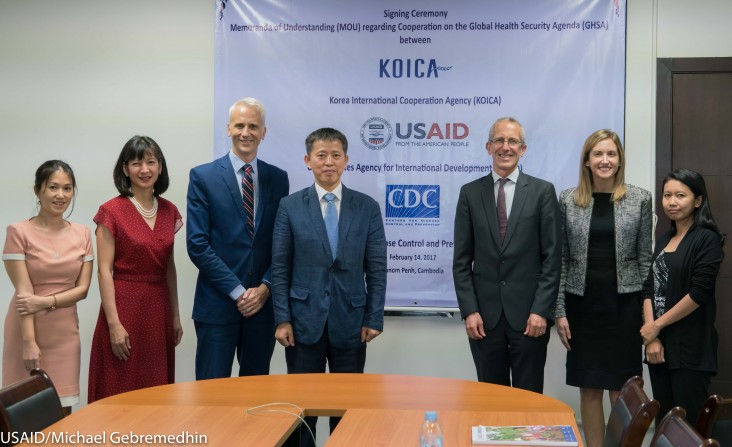
(as prepared for delivery)
- Mr. Jeong Yun Gil, Country Director for KOICA
- Ms. Jiyoon Kim, Deputy Country Director for KOICA
- Colleagues
I am honored to be here today to participate in this signing ceremony.
Cambodia has been on a steady path towards development for over 20 years, having achieved many important milestones. Significant improvements have been made in the quality of the country’s healthcare resulting in better health for its people. Important gains have been made in maternal and child health, and in the fight against infectious disease, including tuberculosis and malaria.
It is always useful to survey where we have been and what ground we still have to travel. While Cambodia has made strong progress in the control of communicable diseases, many now point to non-communicable diseases and to emerging infectious diseases as the areas where new energy needs to be invested.
In the area of emerging infectious disease and global health security, our focus always seems to be trained on the importance of globalization. How much more we travel now and how quickly a virus can infect large amounts of people. Given Cambodia’s position in the heart of Southeast Asia and the ability of pathogens to spread quickly, we recognize the critical importance of early detection and a skilled response to health emergencies.
But ultimately, the roots of transnational global health security rest with individual nations. What is important is how well individual nations are able to prevent, detect, and respond in the event of a pandemic outbreak.
When a pandemic event occurs, the men and women who work in the labs and analyze virus samples are some of our most important resources. In Cambodia, this includes the great staff of the Institut Pasteur du Cambodge. It’s dedicated teams like that who respond in the event of an avian influenza outbreak, like the one that occurred on a duck farm just three weeks ago in Kampong Thom. They help with disinfection, sample collection, and raising public awareness. We will also depend heavily on the medical and veterinary students of today who will be the physicians, veterinarians, biostatisticians, and field epidemiologists of tomorrow. It’s these people - together with all of their colleagues and their leadership in the Ministries of Health, of Agriculture, Forestry and Fisheries – who we depend on when an outbreak occurs. Global health security starts locally and that’s where standards really need to be met.
We are glad to enter into this new phase of partnership with KOICA. We look forward working together to support the Cambodian government’s response to health threats.
Thank you and good luck to our respective teams as they go forward to put this partnership into action.
Related Speeches
- Remarks by Polly Dunford, Mission Director, USAID Cambodia, Launch Event of Feed the Future Cambodia Harvest II
- Remarks by Christina Lau, Deputy Director, Office of Public Health and Education, USAID/Cambodia, Opening Ceremony of the Kick-Off Workshop for “One Health Workforce”
- Remarks by Veena Reddy, Deputy Mission Director, USAID Cambodia, EPIC Showcase







Comment
Make a general inquiry or suggest an improvement.